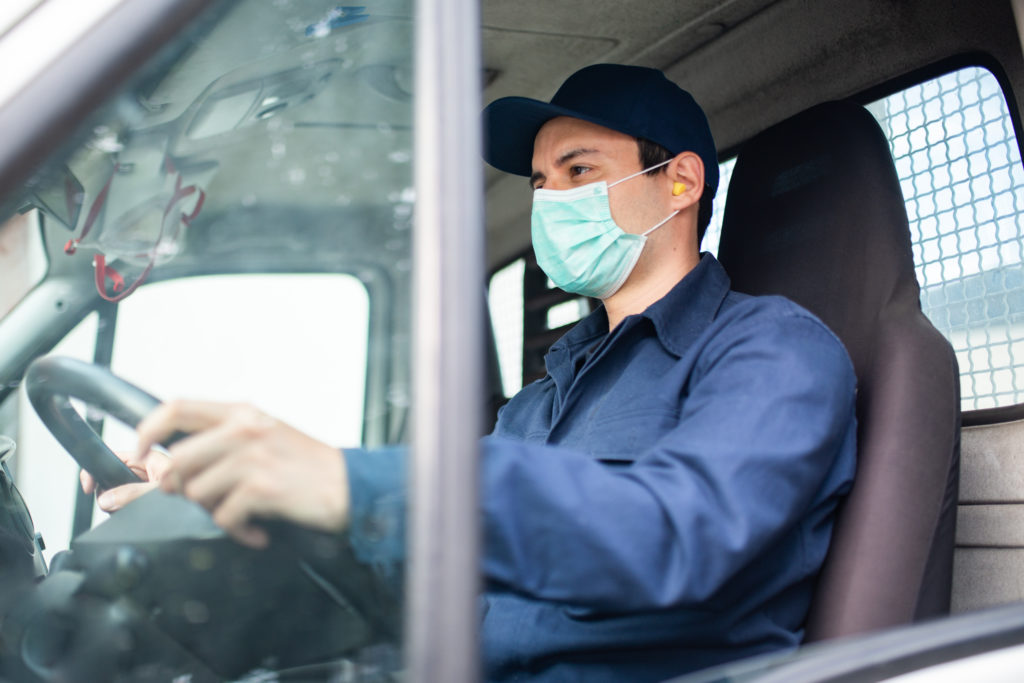Fleets across the United States have had to implement a variety of new safety protocols in the midst of the coronavirus era, and many are deciding to keep such practices intact post-pandemic.
Drivers at Hub Group Trucking, for instance, began thoroughly disinfecting their trucks at the beginning and end of their work shifts, and continue to do so today, explained Hub Group’s executive vice president, Luke Simendinger.
“I think those are just going to be standard operating procedures for us going forward,” he explained. “We do quite a bit of slip-seating, so it was ensuring that all PPE was provided. Any individual that’s going in and out of truck had the disinfectant to do that themselves.”
Additionally, many trucking companies that gave out personal protective equipment to their employees have had workers continue to utilize the gear. Hub Group issued masks, gloves, paper towels and disinfectants to its 3,400 drivers, and both FedEx Corp. and UPS Inc. have employees loyally wearing their masks to this day.
Vehicle transportation service provider United Road also made company-branded fabric masks for its truckers to use–which, of course, they still do.
Professional driver wellness company, Rolling Strong, has noted that it expects its employees to maintain the safety measures that were put in place at the start of the COVID-19 pandemic, because they help stop the spread of a variety of viruses and bacteria. Additionally, the company’s president, Stephen Kane, explained that many workers have made regular habits of these practices.
Still, vehicle maintenance has continued to be a major obstacle for fleets during the pandemic, said Hill Brothers Transportation manager of recruiting and fleet services, Scott Hill. Hill Brothers, which specializes in dry van and refrigerated shipments, is based in Omaha.
For example, technicians must wear gloves and masks, on top of thoroughly disinfecting all surfaces, when a driver brings a truck to the company’s terminal shop. They also must be careful to clean all buttons inside the cab as well as the steering wheel, which can be tedious.
These technicians do “whatever they can do to make sure we’re getting at least another shot at getting some of that bacteria out of the truck,” said Hill. “It’s definitely been tough, but our drivers are the backbone of what we do and we wouldn’t be there without them.”
Another area of change brought to the industry by the pandemic includes that of technology upgrades, which occurred as many fleets boosted their operation capabilities.
In an effort to easily share government health alerts in relation to the pandemic, XPO Logistics implemented an alert service on its XPO Connect platform’s digital dashboard, explained the company’s chief human resources officer, Josephine Berisha. This technology platform is used across the globe by carriers and customers alike.
For United Road, technology played an even bigger role during the pandemic as the company communicated with employees via technology when workers were the most stressed about the virus. In fact, the company implemented a specific email address for COVID-related concerns and held regular virtual town halls to answer employee questions and address worries.
Additionally, United Road set up a smartphone app to help with its electronic logging devices, and used that resource to implement a COVID-19 questionnaire for truckers to finish once every pre-trip inspection was completed.
“We keep a finger on the pulse of the drivers as well,” said Eric Madison, United Roads’ senior vice president of people and safety. “We get a heads-up if there’s ever any need for concern.”
Many companies throughout the industry also began using contactless delivery methods to help reduce bacteria spreading. UPS ceased any required signatures for packages, and Hub Group implemented paperless customer services–which was particularly helpful within handoff-heavy intermodal business.
United Road also switched to contactless deliveries, with drivers using electronic paperwork instead of collecting digital signatures.
“Quite a few of the customers we’ve worked with have physical paperwork that they have to hand to the driver,” said Hill Brother’s Scott Hill. “A lot of that has changed now to where that [paperwork] is emailed or it’s already sent to the end user. If any benefit comes from this, it’s [that] people are trying to figure out how to make things better due to this pandemic. It’s [those] things that are going to continue on even after the pandemic’s over, whenever that may be.”





